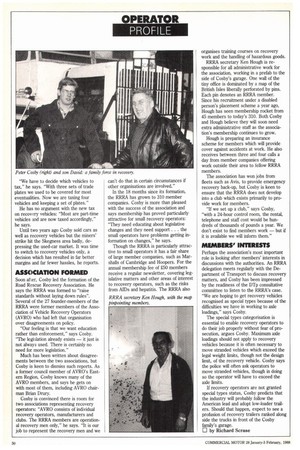OPERAT • R
Page 52

If you've noticed an error in this article please click here to report it so we can fix it.
PROFILE
"We have to decide which vehicles to tax," he says. "With three sets of trade plates we used to be covered for most eventualities. Now we are taxing four vehicles and keeping a set of plates."
He has no argument with the new tax on recovery vehicles: "Most are part-time vehicles and are now taxed accordingly," he says.
Until two years ago Cosby sold cars as well as recovery vehicles but the miners' strike hit the Skegness area badly, depressing the used-car market. It was time to switch to recovery vehicles only, a decision which has resulted in far better margins and far fewer hassles, he reports.
Soon after, Cosby led the formation of the Road Rescue Recovery Association. He says the RRRA was formed to "raise standards without laying down rules". Several of the 27 founder-members of the RRRA were former members of the Association of Vehicle Recovery Operators (AVRO) who had left that organisation over disagreements on policy_ "Our feeling is that we want education rather than enforcement," says Cosby. "The legi3lation already exists — it just is not always used. There is certainly no need for more legislation."
Much has been written about disagreements between the two associations, but Cosby is keen to dismiss such reports. As a former council member of AVRO's Eastern Region, Cosby knows many of the AVRO members, and says he gets on with most of them, including AVRO chairman Brian Drury.
Cosby is convinced there is room for two associations representing recovery operators: "AVRO consists of individual recovery operators, manufacturers and clubs. The RRRA members are operational recovery men only," he says. "It is our job to represent the recovery men and we can't do that in certain circumstances if other organisations are involved."
In the 18 months since its formation, the RRRA has grown to 310 member companies. Cosby is more than pleased with the success of the association and says membership has proved particularly attractive for small recovery operators: "They need educating about legislative changes and they need support. . the small operators have problems getting information on changes," he says.
Though the RRRA is particularly attractive to small operators it has a fair share of large member companies, such as Marshalls of Cambridge and Hooper& For the annual membership fee of 250 members receive a regular newsletter, covering legislative matters and other areas of interest to recovery operators, such as the risks from AlDs and hepatitis. The RRRA also organises training courses on recovery work and the handling of hazardous goods.
RRRA secretary Ken Hough is responsible for all administrative work for the association, working in a prefab to the side of Cosby's garage. One wall of the tiny office is dominated by a map of the British Isles liberally perforated by pins. Each pin denotes an RRRA member. Since his recruitment under a disabled person's placement scheme a year ago, Hough has seen membership rocket from 45 members to today's 310. Both Cosby and Hough believe they will soon need extra administrative staff as the association's membership continues to grow.
Hough is preparing an insurance scheme for members which will provide cover against accidents at work. He also receives between three and four calls a day from member companies offering work outside their area to fellow RRRA members.
The association has won jobs from fleets such as Avis, to provide emergency recovery back-up, but Cosby is keen to ensure that the RRRA does not develop into a club which exists primarily to provide work for members.
"If we set up a club," says Cosby, "with a 24-hour control room, the rental, telephone and staff cost would be hundreds of thousands of pounds a year. We don't exist to find members work — but if it is available we will inform them."
Perhaps the association's most important role is looking after members' interests in discussions with the authorities. An RRRA delegation meets regularly with the Department of Transport to discuss recovery matters, and Cosby has been impressed by the readiness of the DTp consultative committee to listen to the RRRA's case. "We are hoping to get recovery vehicles recognised as special types because of the difficulties we have in working to axle loadings," says Cosby.
The special types categorisation is essential to enable recovery operators to do their job properly without fear of prosecution, argues Cosby. Maximum axle loadings should not apply to recovery vehicles because it is often necessary to move stranded vehicles which exceed the legal weight limits, though not the design limit, of the recovery vehicle. Cosby says the police will often ask operators to move stranded vehicles, though in doing so the operator will have to exceed the axle limits.
If recovery operators are not granted special types status, Cosby predicts that the industry will probably follow the American lead and adopt low-loader trailers. Should that happen, expect to see a profusion of recovery trailers ranked along side the trucks in front of the Cosby family's garage.
by Richard Scrase
























































































